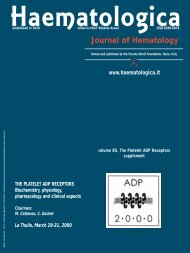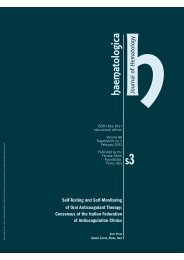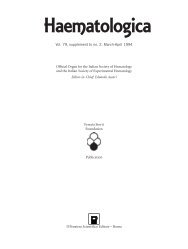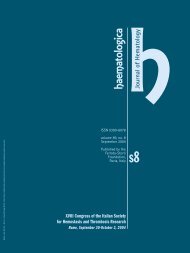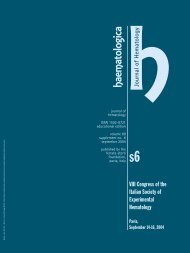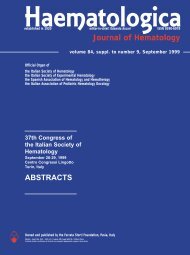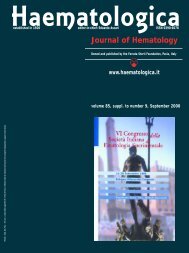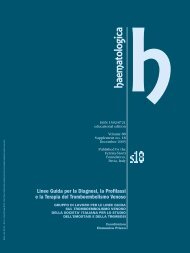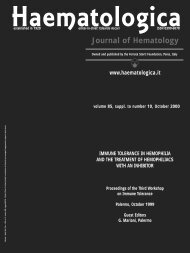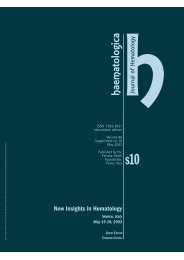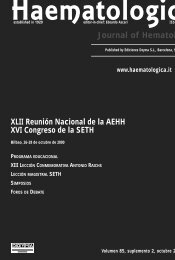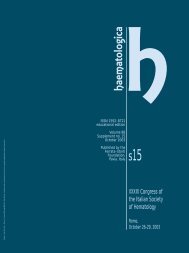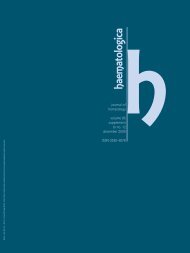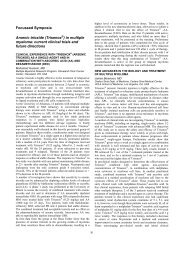2003; baxter - Supplements - Haematologica
2003; baxter - Supplements - Haematologica
2003; baxter - Supplements - Haematologica
- No tags were found...
You also want an ePaper? Increase the reach of your titles
YUMPU automatically turns print PDFs into web optimized ePapers that Google loves.
[Immunobiology of Tolerance Induction]review paperIdiotypic control of inhibitorsJEAN GUY GILLESCenter for Molecular and Vascular Biology,University of Leuven, Belgiumhaematologica <strong>2003</strong>; 88(suppl. n. 12):52-54http://www.haematologica.org/free/immunotolerance2001.pdfThe major complication following factor VIII(FVIII) infusion in hemophilia A patients isthe development of a specific immuneresponse. It is usually admitted that 20% ofpatients under such therapy develop an antibodyresponse towards FVIII. 1 The actual incidence is,however, difficult to provide, with percentagesvarying from 0% to 45% in individual studies, 2depending of the patient population considered,the method used to detect inhibitors, the detectionthreshold level, and the frequency and timepoints (transient inhibitors) at which inhibitordetection is carried out.An important additional factor that furthercomplicates the evaluation of inhibitor incidenceis the fact that anti-idiotypic antibodiescan neutralize the activity of inhibitors in plasma.Idiotype refers to the ensemble of determinantsthat are located within the variable part ofantibodies (Abs1) or antigen-specific receptorsof T-cells. Therefore, anti-idiotypic antibodies(anti-Ids) are second-generation antibodies(Abs2) directed towards the variable part ofpathogenic antibodies and have the theoreticalcapacity to neutralize Ab1 activity and production.It is well established that tolerance to self-proteinis first induced at an early stage by clonaldeletion of self-reactive B- and T-cells in thebone marrow and the thymus, respectively.However, not all self-reactive lymphocytes areeliminated by central deletion. Auto-reactive B-cells are a common feature of peripheral blood,as well as low- or intermediate-affinity self-reactiveT-cells.A number of mechanisms by which such autoreactivecells are rendered non-functioning orare deleted in the periphery have been described.Anti-idiotypic antibodies could represent athird level of tolerance maintenance in this generalscheme, with their capacity to fine tune thefunction of antibodies and maintain a subtleequilibrium between complementary idiotypesCorrespondence: Dr. Jean Guy Gilles, Center for Molecular andVascular Biology, Katholiek Universiteit Leuven, Herestraat 49,B-3000 Leuven, Belgium. Phone: international+32.16.346018. Fax: international +32.16.345990.E-mail: jeanguy.gilles@med.kuleuven.ac.beexpressed on B- and T-cells. 3A good indication of how anti-idiotypîc antibodiescan indeed exert a regulatory mechanismin the periphery is provided by the demonstrationthat healthy individuals with normal levelsof FVIII produced significant titers of inhibitoryantibodies to FVIII, 4,5 the activity of which isundetectable in plasma because of the presenceof complementary anti-idiotypic antibodies.However, such a FVIII inhibitory activity can bereadily detected whenever anti-FVIII antibodiesare purified by a combination of chromatographyand specific immunoadsorption over aninsolubilized-FVIII column. 6 The FVIII inhibitorycapacity of these Abs was demonstrated to beequal to that of anti-FVIII Abs purified fromhemophilia A patient’s plasma with high levelof inhibitors, as measured by the Bethesdaassay. 6Such neutralizing anti-Id activity has also beendetected in a group of patients successfullydesensitized by administration of high doses ofFVIII. 7 The study demonstrated that the concentrationof anti-FVIII antibodies, purified by thesame procedure as for healthy donors, did notchange during desensitization and that antibodiesmaintained their capacity to inhibit the procoagulantfunction of FVIII, even though Bethesdaunit titration in plasma was reduced to undetectablelevels. This showed the potentiallyimportant function of anti-Id regulation in toleranceto the FVIII molecule. Therefore, any newtherapy inducing an increased production ofanti-Id Abs could be a method of choice in thetreatment of inhibitors. A first approach alongthese lines has been reported: patients weretreated by injections of immune complexes madeof FVIII and autologous specific antibodiestowards FVIII, which resulted in a significantreduction in the level of circulating FVIIIinhibitors that were neutralized by correspondinganti-Id Abs. 8 Such an approach could openup the way towards new therapeutic strategiesfor FVIII inhibitors, at potentially low cost comparedto classical desensitization.To get further insight into the mechanisms bywhich anti-FVIII antibodies are produced andthe role of the second generation of Abs (anti-Ids) in FVIII tolerance maintenance and/orhaematologica vol. 88(supplement n. 12):september <strong>2003</strong>



